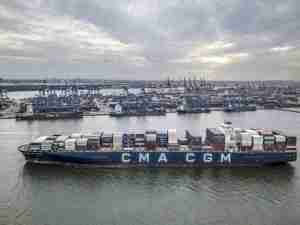Vale will take delivery of the first of 36 Chinamax ore carriers in June 2011 which will carry ore between Brazil and China. The order includes very large crude carrier oil tankers which are being converted to carry ore. Ian Shirreff, Shanghai-based chief executive of Zodiac, which has contracts to bring iron ore to 20 of China's biggest state steel mills, said the development will "have the biggest effect on the market that we've seen in 30 years."
"They're planning 80-100 vessels to drive the market down so low that the differential between Brazil-China freight and Australia-China is minimal," Shirreff told the Coaltrans annual coal conference in Amsterdam.
"Make no mistake, this will happen," he added.
Shirreff said the giant bulk carrier will force rates down, adding that he estimated freight rates would return to the $10,000 to $12,000 a day time charter rate seen in 1977 within the next 5-10 years.
Average earnings for capesize vessels, typically hauling 150,000-tonne cargoes such as iron ore and coal, reached $45,666 a day on Tuesday, Baltic Exchange data showed.
Shirreff said for the next two to five years "the Vale effect" of the new Chinamax giant ore carriers would be the biggest factor affecting freight rates.
"It's all about iron ore, it's all about China," said Gurinder Singh, Vale director freight and international projects for shipping and ports, who spoke on the same panel at the conference as Shirreff.
Vale created the cape market by building cape vessels and persuading Japanese ore buyers to build deep water ports to take them, he said.
"Since 2009, Vale has tried to be part of the shipping market moving from selling free on board at ports to CFR (delivered), and freight and iron ore has decoupled so freight is now a much lower proportion of the delivered cost," Singh said.
"Freight is now 20 per cent of the delivered cost or even lower and 20 per cent is the magic number, it makes us more competitive," he said.
Vale's first Chinamax 400,000 ton ore carrier is delivered next June out of 36 ordered in total plus VLCC oil tankers which are being converted into ore carriers in order to push down the freight cost of iron ore from Brazil to China and compete with Australian ore sellers, he said.
China's growing demand for coal and iron ore imports is undoubted, he said, due to well-known drivers including urbanisation, modernisation and general economic growth.
Singh said China will have three ports next year which can take Chinamax ore vessels and another seven are being built.
"Our customers and Vale need low and stable freight because when the Australia-Brazil differential is $40-60 nobody will buy ore from us but when the freight is low the differential is automatically very little," he said. (Reuters)








